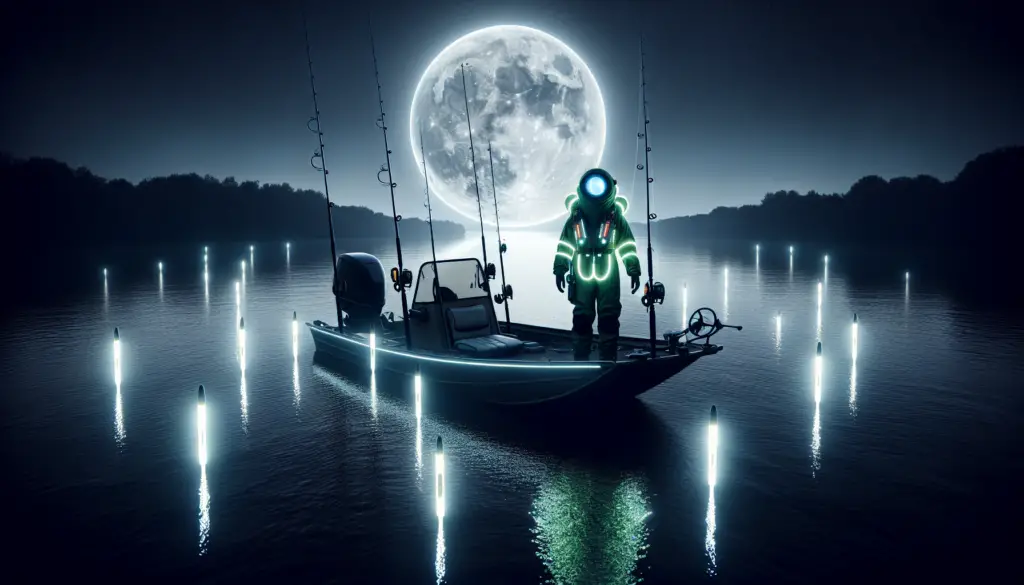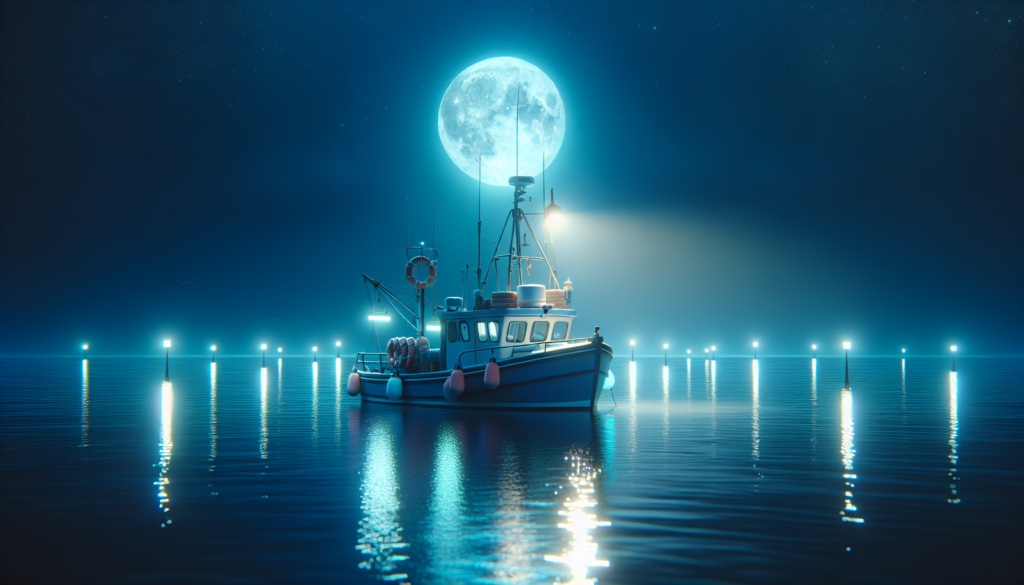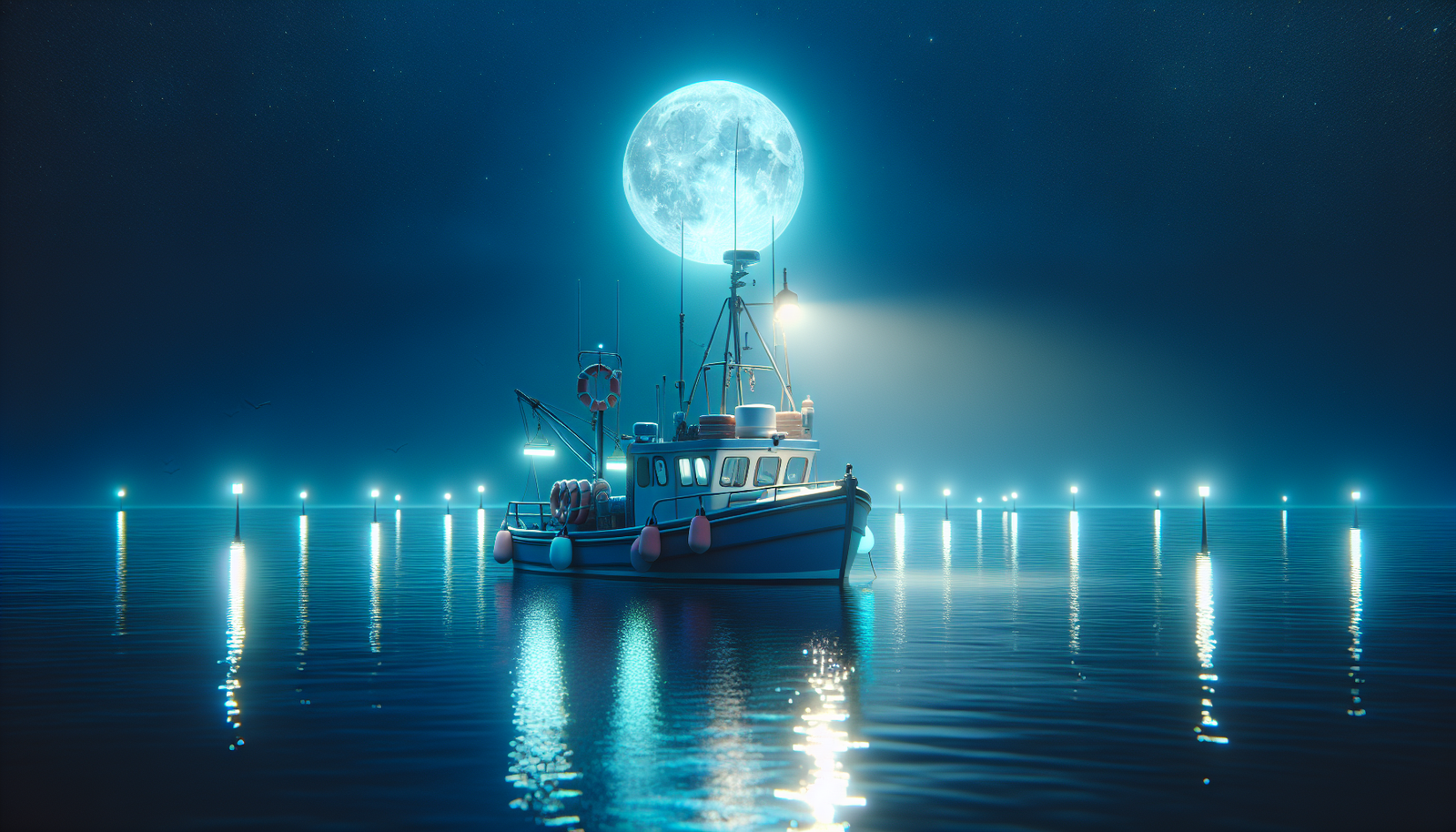Immerse yourself in the symphony of the night under the twinkling stars as you prepare for your adventurous night fishing trip. This piece, “Boating Safety Tips For Night Fishing,” equips you with essential safety pointers to make your nighttime angling less perilous and more exhilarating. It carefully explores potential hazards unique to night fishing and provides handy tips that ensure the safety and success of your aquatic adventure. Engage in your nocturnal pursuit with an ease of mind, armed with these illuminating insights for your next night fishing escapade.

Understanding the Importance of Night Fishing Safety
Night fishing can be an adventurous and rewarding experience. However, it poses some unique challenges and risks which you must acknowledge prior to embarking on your nocturnal expedition. Darkness can conceal not only the wonders of marine life but also numerous hazards, making safety a crucial factor to have an exciting yet secure fishing experience.
Reasons to emphasize safety during night fishing
Unlike daytime fishing, everything in the night appears more intimidating and tricky. Lack of natural light and reduced visibility can make navigation exceedingly difficult. Also, unaware encounters with other water vehicles, floating debris and marine creatures may put your safety at risk. Bearing this in mind, safety during night fishing becomes far more important, potentially saving you from detrimental situations.
Potential hazards of nighttime fishing
The allure of nighttime fishing can lure you into a web of potential hazards. Hazards such as unpredictable weather changes, faulty equipment, inadequate lighting, navigating difficulties, unexpected water conditions, slips and falls are magnified during nighttime fishing. Thus, awareness of these potential hazards is the first step towards minimizing their risks.
Navigational Knowledge for Night-time
Being out fishing after sunset amplifies the importance of sound navigational knowledge. With limited visibility, having a grasp of your surroundings and location is not just a bonus but a necessity.
Understanding water depth and currents
The invisible undercurrents and undecipherable water depths can pose major challenges during night fishing. A wrong step can prove disastrous. Therefore, understanding water depth and currents using sonar and other technological devices becomes indispensable.
Identifying landmarks and navigational aids
Unlike the daytime, nighttime restricts your external reference points curtailing your perception of direction. Identifying landmarks and utilizing navigational aids like buoys, radar reflectors, lightships, etc., can be your guiding light in the dark mystery of the night.
Using GPS and marine charts
In the modern age, technology is a reliable partner for night-time navigators. GPS and marine charts can help you map your journey, pinpoint your location, and chart a safe course, reinforcing your sense of direction and safety in the oblivious surroundings.
Appropriate Use of Boat Lights
Apt lighting can be your knight in shining armor during night fishing, providing you with vision in the dark veil of the night.
Importance of having a well-lit boat
A well-lit boat can not only illuminate your path forward but also make you visible to other vessels in the vicinity, thus reducing chances of collisions. Moreover, proper lighting can ease tasks like baiting hooks, moving around the boat, and spotting floating objects or markers.
Understanding the different boat lights and their uses
Boat lights are not just another accessory but an integral component to ensure safety. From bow lights to stern lights, each light serves a unique purpose. Knowing their functions and using them accordingly can greatly enhance your overall safety and visibility on the water.
Maintaining and checking boat lights regularly
Lights can fail, and when they do, they can leave you defenseless in the dark abyss. Regular maintenance and checks of boat lights can help assure their functionality and reliability when you most need them.

Wearing Appropriate Gear
Pooling your arsenal with the right fishing and safety gear is just as important as having navigational knowledge and using boat lights effectively.
Essential fishing and safety gear for night
Different gear is required for different fishing scenarios, and night fishing is no exception. Equipping yourself with the essential fishing tools and safety gear – like a good quality rod and reel, different types and sizes of hooks and baits, various types of lines, and crucial safety equipment such as life-vests, first-aid kits, waterproof flashlights – can bolster your safety and increase the chances of a successful fishing adventure.
Importance of high-visibility clothing
Just as important as a well-lit boat is making yourself visible. Wearing high-visibility clothing with reflective strips can make you easy to spot, decreasing the risk of accidents or collisions dramatically. It can be the difference between being seen or being swamped by a passing boat.
Effective use of lifejackets
Lifejackets are lifesavers. Literally. Even if you are an adept swimmer, it is a sane practice to wear a lifejacket at all times on the boat. Night conditions combined with unpredictable weather and rough water conditions can make swimming back to safety extremely challenging or impossible. Hence, a lifejacket at your aid can be a real-life buoy in emergencies.
Communications and Signalling Devices
Communication and signaling devices are indispensable boating gears that serve as safety corridors connecting you to external help when in need.
Importance of reliable communication devices
In the midst of the sea or a large lake, connectivity can be an issue. Having reliable communication devices ensures you are never completely isolated. These devices help you stay connected with the shore and other boats, enabling you to call for aid or share important information.
Understanding various signalling devices for boats
There’s a gamut of signaling devices – flares, air horns, signal mirrors – each with a unique purpose and use. Understanding them and their implications can safeguard you against unforeseen mishaps while increasing your chances of rescue in distress situations.
Using marine radios, flares and air horns
Marine radios, flares and air horns are some of the most common and important signaling devices for boaters. A marine radio can enable you to communicate crucial messages, while flares and air horns can call for attention and help in emergency situations.
Understanding Weather and Water Conditions
Knowing how to interpret weather forecasts and adapting to unexpected weather changes is like arming yourself with a shield against potential hazards.
How to interpret weather forecast
Interpreting weather forecasts, wind conditions, temperature changes, and humidity levels are crucial factors to consider before and during your night fishing venture. This can keep you proactively prepared for potential weather-related fishing and safety scenarios.
Tackling unexpected weather changes
Despite the advancements in weather forecasting technology, unexpected weather changes are common and can be extremely hazardous. Developing skills to swiftly adapt to sudden weather changes can help ensure that you stay safe and secure while venturing out at night.
Implications of water temperature and condition on fishing and safety
The water temperature and conditions can greatly affect the fish behavior and your safety. Understanding how different fish species respond to different water conditions, and knowing how weather conditions influence water safety, plays an essential role in determining your overall fishing and boating experience.
Effective Use Of Anchors
Anchors are more than just hefty chunks of metal. Properly used, they can provide stability to your boat and ensure your vessel remains stationary when necessary.
When and how to properly use an anchor
Anchoring skills are essential, especially for night fishing. Familiarizing yourself with when and how to drop the anchor can ease your fishing process while keeping your boat stable in desired fishing spots or during emergencies.
Safety precautions while using anchors
Safety precautions should never be compromised. From the deployment of the anchor to its retrieval, taking safety measures can avoid potential accidents and guarantee smooth anchoring operations.
Checking your anchor rope for wear
The anchor is as good as the rope holding it! Continuous exposure to water and strain can weaken the anchor rope over time. Regular checking of the anchor rope condition can prevent abrupt anchor failures and mishaps.
Safe Operation of the Boat
Irrespective of the time of day, safe boat operations form the basis of every successful fishing adventure.
Avoiding overloading the boat
Overloading the boat not only hampers its performance but might also lead to boat instability and tip-overs. Therefore, adhering to the stated capacity of your boat is essential for your safety and to ensure the efficient operation of the boat.
Operating at safe speeds
Speed may thrill but it might also kill. Operating your boat at safe speeds, especially during night time, is always a prudent practice. It not just ensures your and other boaters’ safety, but also makes your fishing trip more enjoyable and less chaotic.
Adhering to maritime laws and regulations
Maritime laws and regulations are there to keep you and other water users safe. Respecting and adhering to these rules is the cornerstone of safe boating practice. Ignoring them doesn’t just invite penalties but can also turn your exciting night fishing expedition into a disaster.
Alcohol and Drug Use Precaution
Alcohol and drug use impair judgment and coordination, making them a hazard in any boating environment.
Understanding the impact of alcohol and drugs on boating safety
The dangers of boating under the influence of alcohol or drugs cannot be overstated. It affects the operator’s vision, balance, coordination, and judgment. With the amplified risks and challenges of night fishing, boating under these intoxicants is a recipe for disaster.
Laws and penalties related to intoxicated boating
Taking the helm while intoxicated not only endangers your life but also others’ on the water. Authorities are understandably strict about drug and alcohol use before and during boating. Violating these laws attracts hefty fines, license suspensions or even jail time.
Emergency Preparedness
Emergencies can strike anytime, and night-time fishing is no exception. Preparing for possible emergencies can make a tremendous difference in the outcome.
Having a comprehensive emergency plan
Having a comprehensive emergency plan is like having an escape chute. It addresses and prepares you for potential dangers and emergencies, ensuring you don’t panic when adversity strikes and you’re armed with a plan of action.
Equipments to have on board in case of emergencies
Seasickness medication, extra layers of clothing, blankets, extra food and water, a first-aid kit, flashlights, tools for minor repairs, fire extinguishers, tow ropes, and flotation devices– these are few of the many emergency equipment that you should always have on board, ready to tackle the unexpected turn of events.
Knowing distress signals and emergency radio frequencies
In emergencies, knowing how to signal your distress and being able to communicate over emergency radio frequencies can be your lifeline. It can help expedite the rescue process and can be a beacon of hope in challenging circumstances.
Whether you are an enthusiast exploring the magic of the night sea or a professional angler, the considerations and tips mentioned above can surely guide you to indulge in a safe and successful night fishing expedition. So follow these guidelines, reel in your catch, and savor the calmness of the dark waters while ensuring your safety all along. Happy fishing!

